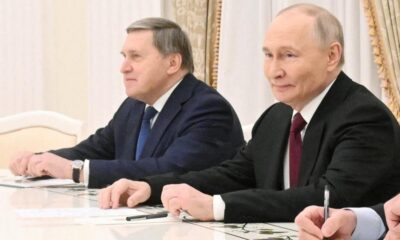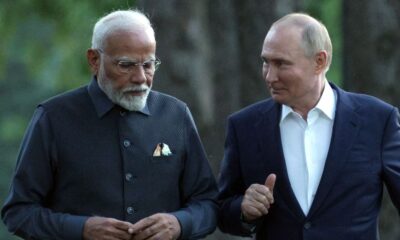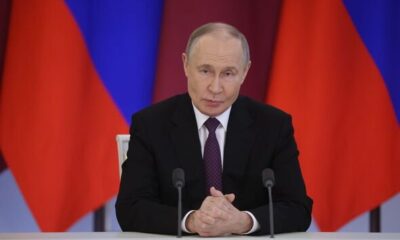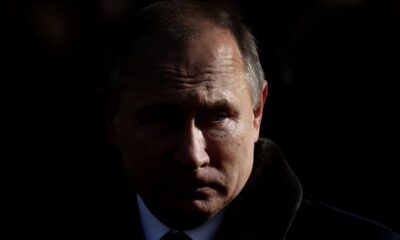Politics
Kremlin Warns West’s Asset Plans Could Trigger Legal Fallout

The Kremlin has issued a stern warning regarding Western plans to utilize frozen Russian assets for aid to Ukraine, describing these actions as potential “theft” that could lead to significant legal ramifications. The warning follows a proposal by Ursula von der Leyen, President of the European Commission, for a €140 billion ($165 billion) “reparations loan” aimed at supporting Ukraine’s defense industry by purchasing EU-made weapons.
Dmitry Peskov, the Kremlin spokesperson, emphasized that the initiative to tap into frozen Russian funds would not only breach legal norms but also undermine trust in the Western financial system. “These plans are all about the illegal seizure of Russian property. We are talking about theft,” Peskov stated during a press briefing. He further warned that such actions could have repercussions for nations involved, suggesting a “boomerang” effect that could damage their investment attractiveness.
The conflict between Russia and Ukraine has led to the freezing of approximately $300 billion in Russian sovereign assets by Western nations, with about two-thirds held by Euroclear, a Belgium-based clearinghouse. These funds have accrued significant interest, generating billions that the West seeks to redirect to Ukraine. Last year, the G7 endorsed a plan to use this interest to secure $50 billion in loans for Ukraine, though many initiatives have so far avoided outright confiscation due to legal concerns and implications for global financial stability.
Several EU member states have already voiced their opposition to von der Leyen’s proposal, warning that it could violate international law. Bart De Wever, the Prime Minister of Belgium, described the initiative as a “dangerous precedent,” highlighting the potential legal and diplomatic fallout. EU leaders are anticipated to discuss the matter further at an informal European Council meeting in Copenhagen scheduled for later today.
In the United States, a resolution presented to the Senate is advocating for the G7 to seize the frozen funds and send them to Ukraine in monthly installments. Moscow has consistently condemned the asset freeze and any attempts to redirect Russian funds as illegal, vowing to retaliate against such measures.
The ongoing situation underscores the complexities surrounding international financial law and the geopolitical tensions that continue to evolve as the conflict in Ukraine persists. As discussions unfold within both the EU and the US, the implications of these asset-tapping strategies remain a focal point for global leaders and financial institutions alike.
-

 Entertainment3 months ago
Entertainment3 months agoAnn Ming Reflects on ITV’s ‘I Fought the Law’ Drama
-

 Entertainment4 months ago
Entertainment4 months agoKate Garraway Sells £2 Million Home Amid Financial Struggles
-

 Health3 months ago
Health3 months agoKatie Price Faces New Health Concerns After Cancer Symptoms Resurface
-

 Entertainment3 weeks ago
Entertainment3 weeks agoCoronation Street Fans React as Todd Faces Heartbreaking Choice
-

 Entertainment3 months ago
Entertainment3 months agoCoronation Street’s Carl Webster Faces Trouble with New Affairs
-

 Entertainment3 months ago
Entertainment3 months agoWhere is Tinder Swindler Simon Leviev? Latest Updates Revealed
-

 World3 weeks ago
World3 weeks agoBailey Announces Heartbreaking Split from Rebecca After Reunion
-

 Entertainment4 months ago
Entertainment4 months agoMarkiplier Addresses AI Controversy During Livestream Response
-

 Science2 months ago
Science2 months agoBrian Cox Addresses Claims of Alien Probe in 3I/ATLAS Discovery
-

 Health5 months ago
Health5 months agoCarol Vorderman Reflects on Health Scare and Family Support
-

 Entertainment4 months ago
Entertainment4 months agoKim Cattrall Posts Cryptic Message After HBO’s Sequel Cancellation
-

 Entertainment3 months ago
Entertainment3 months agoOlivia Attwood Opens Up About Fallout with Former Best Friend





















